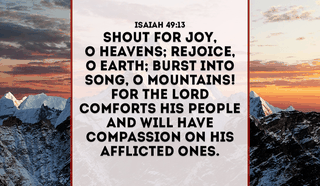
- Recent Translations
- All Translations
Yǐsaìyàshū 49
Share
Settings
Yǐsaìyàshū 49 Commentary
Chapter 49
The unbelief and rejection of the Jews. (1-6) Gracious promise to the Gentiles. (7-12) God's love to the church. (13-17) Its increase. (18-23) And deliverance. (24-26)
Verses 1-6 The great Author of redemption shows the authority for his work. The sword of his word slays the lusts of his people, and all at enmity with them. His sharp arrows wound the conscience; but all these wounds will be healed, when the sinner prays to him for mercy. But even the Redeemer, who spake as never man spake in his personal ministry, often seemed to labour in vain. And if Jacob will not be brought back to God, and Israel will not be gathered, still Christ will be glorious. This promise is in part fulfilled in the calling of the Gentiles. Men perish in darkness. But Christ enlightens men, and so makes them holy and happy.
Verses 7-12 The Father is the Lord, the Redeemer, and Holy One of Israel, as sending the Son to be the Redeemer. Man, whom he came to save, put contempt upon him. To this he submitted for our salvation. He is a pledge for all the blessings of the covenant; in him God was reconciling the world to himself. Pardoning mercy is a release from the curse of the law; renewing grace is a release from the dominion of sin: both are from Christ. He saith to those in darkness, Show yourselves. Not only see, but be seen, to the glory of God, and your own comforts. Though there are difficulties in the way to heaven, yet the grace of God will carry us over them, and make even the mountains a way. This denotes the free invitations and the encouraging promises of the gospel, and the outpouring of the Spirit.
Verses 13-17 Let there be universal joy, for God will have mercy upon the afflicted, because of his compassion; upon his afflicted, because of his covenant. We have no more reason to question his promise and grace, than we have to question his providence and justice. Be assured that God has a tender affection for his church and people; he would not have them to be discouraged. Some mothers do neglect their children; but God's compassions to his people, infinitely exceed those of the tenderest parents toward their children. His setting them as a mark on his hand, or a seal upon his arm, denotes his being ever mindful of them. As far as we have scriptural evidence that we belong to his ransomed flock, we may be sure that he will never forsake us. Let us then give diligence to make our calling and election sure, and rejoice in the hope and glory of God.
Verses 18-23 Zion is addressed as an afflicted widow, bereaved of her children. Numbers flock to her, and she is assured that they come to be a comfort to her. There are times when the church is desolate and few in number; yet its desolations shall not last for ever, and God will repair them. God can raise up friends for returning Israelites, even among Gentiles. They shall bring their children, and make them thy children. Let all deal tenderly and carefully with young converts and beginners in religion. Princes shall protect the church. It shall appear that God is the sovereign Lord of all. And those who in the exercise of faith, hope, and patience, wait on God for the fulfilment of his promises, shall never be confounded.
Verses 24-26 We were lawful captives to the justice of God, yet delivered by a price of unspeakable value. Here is an express promise: Even the prey of the terrible shall be delivered. We may here view Satan deprived of his prey, bound and cast into the pit; and all the powers that have combined to enslave, persecute, or corrupt the church, are destroyed; that all the earth may know that our Saviour and Redeemer is Jehovah, the mighty One of Jacob. And every effort we make to rescue our fellow-sinners from the bondage of Satan, is, in some degree, helping forward that great change.
Yǐsaìyàshū 49 Commentaries
Chapter Summary
INTRODUCTION TO ISAIAH 49
This is a prophecy concerning Christ, and redemption by him; and of the enlargement of the church in the latter day, by the conversion of Jews and Gentiles; which the isles, and people afar off, are exhorted to listen and hearken to, delivered out by the prophet, in the person of Christ; who gives an account of his call to his office, and the time of it; of what the Lord did for him, and said unto him, Isa 49:1-3, then follows a complaint of his labouring in vain, and a correction of it, Isa 49:4 and a further declaration of his call and appointment to office, and of each of the parts of the work assigned him, with encouragement to it, Isa 49:5,6. Christ is again represented under discouraging circumstances, as despised of men, abhorred by the nation, and a servant of rulers; who is encouraged by divine promises that kings should rise up before him, and worship him; that God would be faithful to his promise to him, and yet choose him, hear and help him, at a proper time; preserve him, and give him for a covenant to the people, to the establishment of the earth, and making it habitable, Isa 49:7,8 for the release of prisoners, and feeding, leading, and guiding them, and removing all difficulties out of the way, Isa 49:9-11 when the calling of the Gentiles is foretold, which would occasion great joy in the world, Isa 49:12,13 yet the church is introduced as complaining that she was forsaken of God, Isa 49:14 which is denied, and the contrary affirmed; being dear to the Lord as a sucking child to its mother, and more so; never forgotten by him, and always under his care, Isa 49:16, and, for her comfort, she is assured that those who had destroyed and made her waste should be removed; and that she should have converts that would be an ornament to her, and these numerous, insomuch that the place of their habitation would be too strait and narrow, and which would be matter of astonishment to her, Isa 49:17-21 and, besides those that would be converted in the land of Judea, there would be great numbers in the Gentile world converted by the power of God accompanying his Gospel, set up as a standard there, kings and queens countenancing and encouraging the interest of Christ, Isa 49:22,23 and yet still it is questioned whether the church should be delivered from her oppressors, Isa 49:24 to which it is answered, that she should be delivered, and her persecutors destroyed; by which it would be known that the Lord is the Redeemer and Saviour of his people, Isa 49:25,26.
